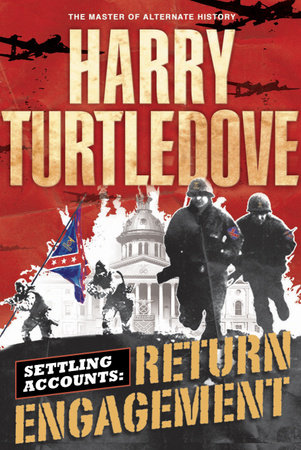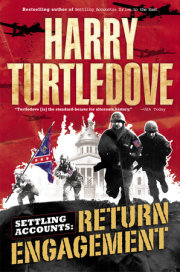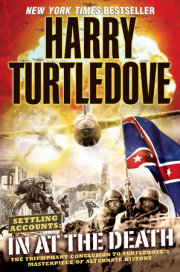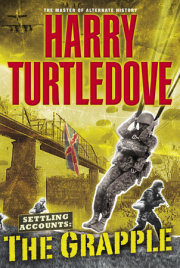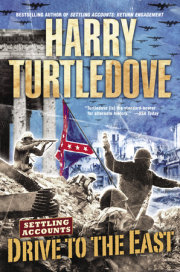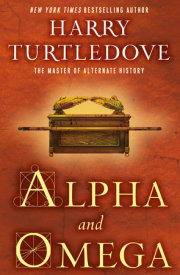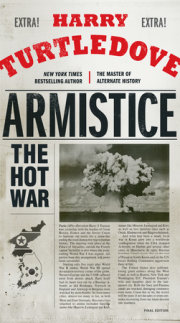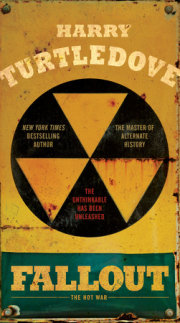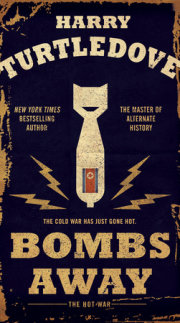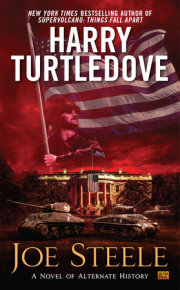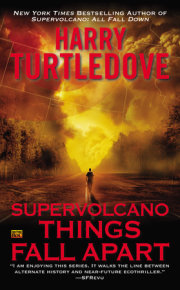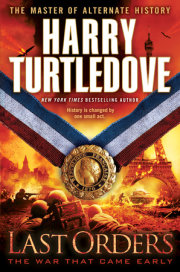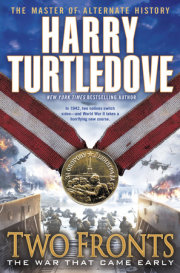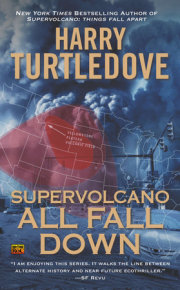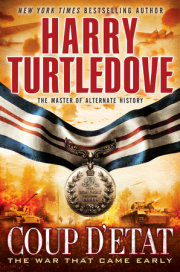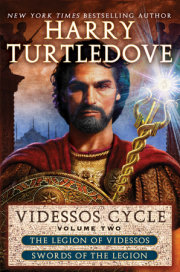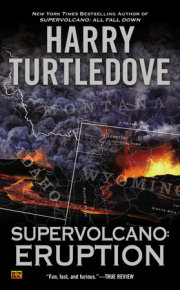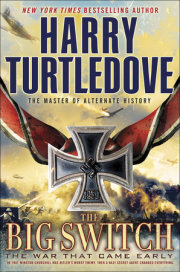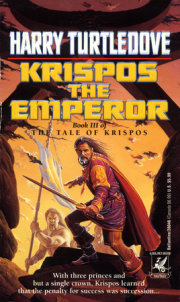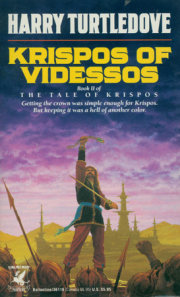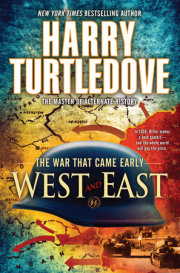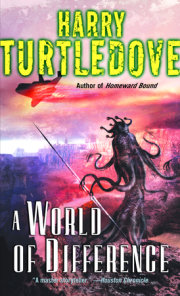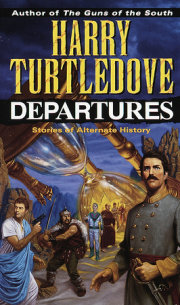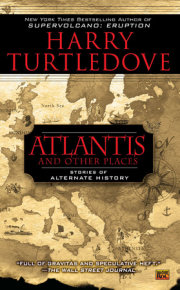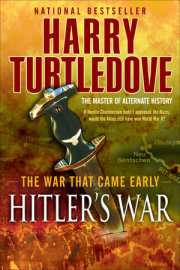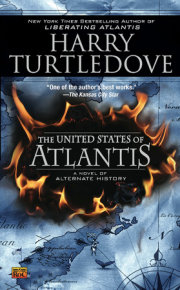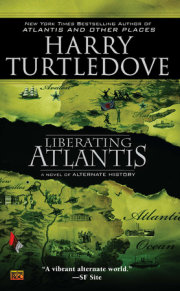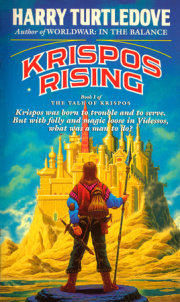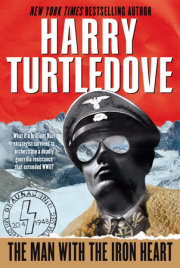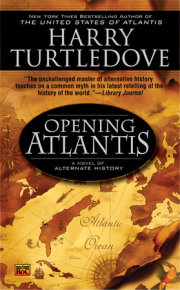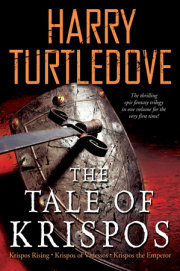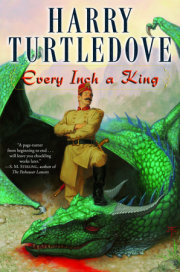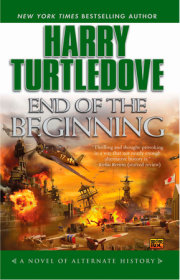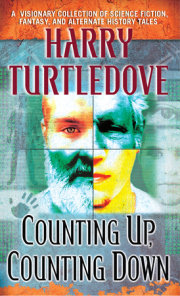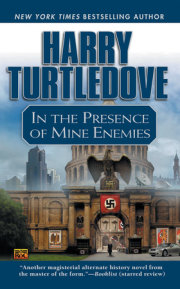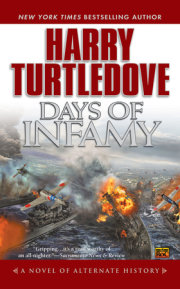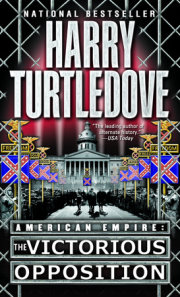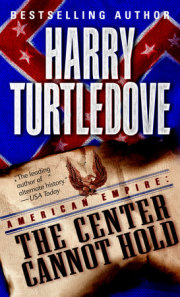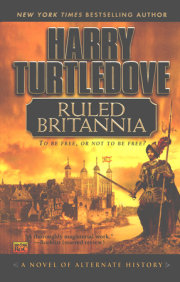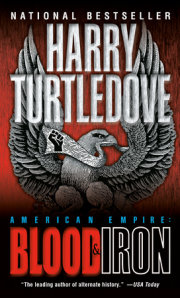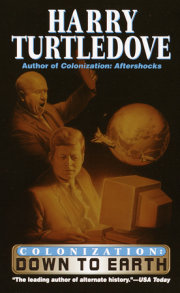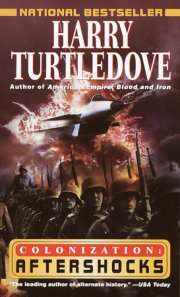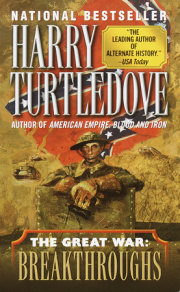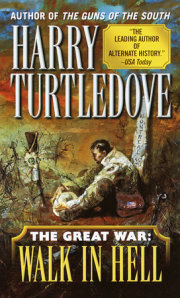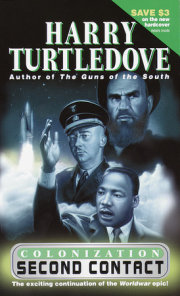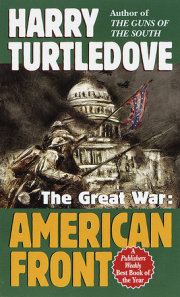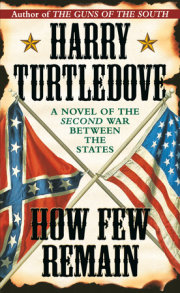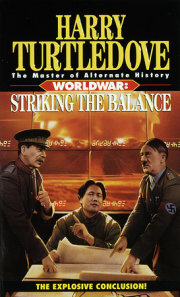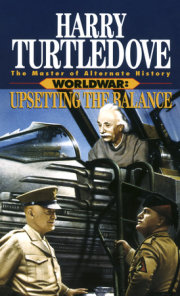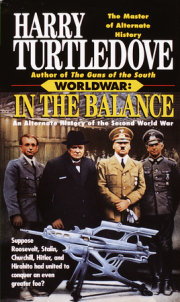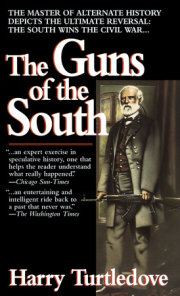I
Flora Blackford woke from nightmare to nightmare. She’d dreamt she was trapped in a burning building, with fire alarms and sirens screaming all around her. When her eyes opened, she thought for a dreadful moment that she was still dreaming, for sirens were wail- ing outside. Then reason returned along with consciousness, and the Congresswoman from New York groaned. Those were air-raid sirens, which could only mean the war had started at last.
Or maybe it’s a drill, Flora thought, snatching desperately at hope, though a drill at—she looked at the alarm clock on the nightstand—four in the morning struck her as madness. Of course, a new round of war between the United States and the Confederate States struck her as madness, too.
Antiaircraft guns in the defense ring around Philadelphia began to pound. That sound banished the last vestiges of doubt. Guns inside the de facto capital of the USA opened up a moment later. Through the gunfire and the sirens, she heard a deep, distant throbbing that rapidly grew louder. Those were Confederate bombers overhead.
She sprang out of bed and threw a housecoat on over the thin cotton nightgown she’d worn against the muggy heat of the first days of summer in Philadelphia. She had one arm in the quilted housecoat and one arm out when she suddenly stopped in outrage that seemed ridiculous only later. “That bastard!” she exclaimed. “He didn’t even declare war!”
A new sound joined the cacophony outside: the thin whistle of falling bombs. As the first explosions made the windows of her flat rattle and shake, she realized President Jake Featherston of the CSA wouldn’t have to send Al Smith, his U.S. counterpart, any formal messages now.
Fear joined outrage. She could die here. So could her son. She ran to his bedroom and threw open the door. “Joshua! Get up!” she shouted. “We’ve got to get down to the basement! The war is here!”
Only a snore answered her. At sixteen, Joshua could sleep through anything, and he’d proved it. Sirens? Antiaircraft guns? Droning bombers? Bombs? Probing searchlights? His mother yelling? They were all one to him, and likewise all nothing to him.
“Get up!” Flora shouted again. Still no response. She went over to the bed and shook him. “Get up!”
That did the job. Joshua Blackford sat up and muttered for a moment. He didn’t doubt what was going on around him the way his mother had. “They really went and did it!” he said.
“Yes, they really did,” Flora agreed grimly. Bombs were bursting closer now, underscoring her words. “Come on. Get moving. Put on a bathrobe or something and get downstairs with me. We don’t have time to dawdle.”
Later, she would discover that putting on a bathrobe when you were already wearing pajamas was dawdling, too. But that would be later. In the wee small hours of June 22, 1941, she was doing as well as she could.
Someone pounded on the door. “Get out! Get downstairs!” a hoarse male voice yelled.
“We’re coming!” Flora shouted back. Joshua flew into a terry-cloth robe. Flora grabbed a key and locked the door behind her when she and her son left the apartment. Those niceties would also go by the board later on.
Down the stairs they scurried, along with the other members of Congress and bureaucrats and businessmen and their families who rented here. For the moment, everybody was equal: equal in fear and equal in fury. In the darkness of the stairwell, people said exactly what they thought of Jake Featherston, the Freedom Party, and the Confederate States of America. Flora heard some things she’d never heard before. No one cared if women were within earshot. Some of the most inflammatory things came from the mouths of women, as a matter of fact.
The basement was dark, too, dark and crowded and hot and stuffy. Someone lit a match to start a cigarette. The brief flare of light might have been a bomb itself. Flora wished she hadn’t thought of that comparison. If a bomb did hit this building . . .
“Sh’ma yisroayl, adonai elohaynu, adonai ekhod,” she murmured, just in case.
More bombs burst, some of them very close. The basement shook, as if at an earthquake. Plaster pattered down from the ceiling. A woman screamed. A man groaned. Beside Flora, Joshua whispered, “Wow!”
She wanted to hit him and kiss him at the same time. He was reacting to the spectacle, to what people were doing all around him. Fear? He knew nothing of fear because at his age he didn’t really believe anything could happen to him. Flora was heading into her mid-fifties. She knew perfectly well that disaster could knock on the door.
A rending crash came from outside, different from the sharp, staccato roars of the exploding bombs. “We got one of the fuckers, anyway,” a man said in tones of ferocious satisfaction.
A bomber. That was what that had to be. A Confederate bomber had smashed to earth somewhere not far away. How many young men had been aboard it? How many had managed to get clear and parachute away before it went into its last fatal dive? And how many Philadelphians had they killed before they were shot down? If you were going to ask the other questions, you had to ask that one, too.
The raid lasted a little more than an hour. Little by little, bombs came at longer intervals. The drone of engines overhead faded. The antiaircraft guns kept ravening away for several minutes after the bombers were gone. Some of them went on shooting even after the continuous all-clear note replaced the warbling rise and fall of the air-raid alarm.
“Well, that was fun,” somebody behind Flora said. Along with half a dozen other people, she laughed—probably louder than the joke deserved. But it cut the tension, and there had been enough tension in the air to need a lot of cutting.
“What do we do now, Mom?” Joshua asked.
“We go back up to the flat and see what happened to it,” Flora answered. “Then I have to go in to Congress. Featherston may not have bothered with a declaration of war, but President Smith will, and they’ll need me to vote for it.”
Back in 1914, as a Socialist agitator in New York City, she’d urged her party not to vote for the credits that financed the opening act of the Great War. She remained a Socialist. These days, though, the country had a Socialist president (which would have seemed unimaginable in 1914) and had been wantonly attacked by the Confederate States (which wouldn’t have seemed surprising at all).
As they left the basement, morning twilight was brightening toward dawn. “That’s why the Confederate bombers went home,” Joshua said as they climbed stairs. “They didn’t want to hang around when our gunners and fighter pilots could get a good look at them.”
“I didn’t know I had a son on the General Staff,” Flora said. Joshua snorted but looked immensely proud of himself.
When they went back into the apartment, they found glass everywhere: on the floors, on the beds, some glittering shards driven deep into the plaster of the far wall. The windows were gone, every single one of them. Flora eyed the shards with a fresh horror. What would those flying fragments of glass have done to people whose soft flesh happened to get in the way? Butchered them. That was the only word Flora could think of.
Joshua was staring out at the city. His head slowly swung from left to right, taking it all in like a panning newsreel camera. Flora joined him. There were bomb craters half a block down the street. A little farther away, a black, greasy pillar of smoke rose into the sky. Was that the bomber’s pyre? She thought so.
More columns of smoke rose all over Philadelphia. Most of them came from the center of town, where government buildings had gone up ever since the 1880s. Most, but not all. The Confederates had dropped bombs all over the city. Bad aim? Deliberate terror? Who could guess?
Fire engine sirens screeched as the sun came up over the horizon. When Flora tried to turn on the bathroom lamp, she discovered the power had gone out. “Don’t leave the icebox open very long—it lets the cold out,” she called to Joshua as she dressed. They had an electric refrigerator, but she was used to the older word. “I’m going to Congress.” She hurried out the door and down the stairs.
Two Representatives and a Senator were already at the curb trying to flag a taxi. Flora got one by walking out in the street in front of it. The driver didn’t—quite—run over her. All the elected officials piled in. “To Congress!” they bawled.
The neoclassical mountain of a building where the Senate and House met had escaped damage, though firemen were fighting flames in the office building across the street and dragging bodies out of it. “Joint session!” Flora didn’t even know where she first heard it, but it was everywhere as soon as she got into the rotunda. “President Smith will address a joint session.”
A joint session meant shoehorning the Senate into the far larger House chamber along with the Representatives. Today, there were still some empty seats after that: members of Congress who couldn’t get to the session or who were injured or dead. A joint session also meant the risk of a lucky bomb taking out the whole legislative branch and the President. Flora wished she hadn’t thought of that.
“Ladies and gentlemen, the President of the United States!” the Speaker of the House boomed out. The wave of applause that greeted Al Smith was fierce and savage.
Smith himself looked like hell. People had called him the Happy Warrior, but he seemed anything but happy as he mounted the podium. He had aged years in the months since his acceptance of a U.S.-C.S. plebiscite in Kentucky and Houston (now west Texas again) and Sequoyah proved such a spectacularly bad idea. His hands shook as he gathered the pages of his speech.
But his voice—even more strongly New York–flavored than Flora’s—rang out strong and true. A thicket of microphones picked it up and carried it across the USA by wireless: “I have to tell you now that this country is at war with the Confederate States of America. At the close of my address, I shall ask the Congress to make the official declaration, a formality the Confederate States have forgotten.” Another furious round of applause said he would get what he asked for.
He went on, “You can imagine what a bitter blow it is for me that all my long struggle to win peace has failed. Yet I cannot believe that there is anything more or anything different that I could have done and that would have been more successful. Up to the very last it would have been quite possible to have arranged a peaceful and honorable settlement between the CSA and the USA, but Featherston would not have it. He had evidently made up his mind to attack us whatever happened, and although he may claim he put forward reasonable proposals which we rejected, that is not a true statement.
“His action shows convincingly that there is no chance of expecting that this man will ever give up his practice of using force to gain his will. He can only be stopped by force. We have a clear conscience. We have done all that any country could do to establish peace. But now that it has come to war, I know every American will play his part with calmness and courage.
“Now may God bless you all. He will defend our cause. It is the evil things that we shall be fighting against—brute force, bad faith, injustice, oppression, and persecution—and against them I am certain that the right shall prevail.”
Flora applauded till her palms hurt. It was a good speech. The only way it could have been better was if Al Smith hadn’t had to give it at all.
When the air-raid sirens screeched in the middle of the night, Armstrong Grimes thought it was a drill. He figured some sadistic officer had found a new way to rob him of sleep, as if basic training didn’t take enough anyhow. But listening to a sergeant screaming, “Get moving, assholes! This is the real thing!” sent him bouncing out of his cot in a hurry.
He could normally dress in three minutes. He had his green-gray uniform on in under two. “Do we line up for roll call?” somebody yelled.
“Jesus Christ, no!” the sergeant hollered back. “Get your asses into the shelter trenches! If you bastards live, we’ll count you later.”
They’d dug the shelter trenches near the Fort Custer barracks outside Columbus, Ohio, the week before. Wasted work, Armstrong had thought. And it had been, then, in the dim dark disappearing days of peace. Now war was coming, riding closer every second on the screams of the sirens. War was coming, and what had been waste might save his life. A lesson lurked there somewhere, if only he could find it.
Copyright © 2004 by Harry Turtledove. All rights reserved. No part of this excerpt may be reproduced or reprinted without permission in writing from the publisher.

